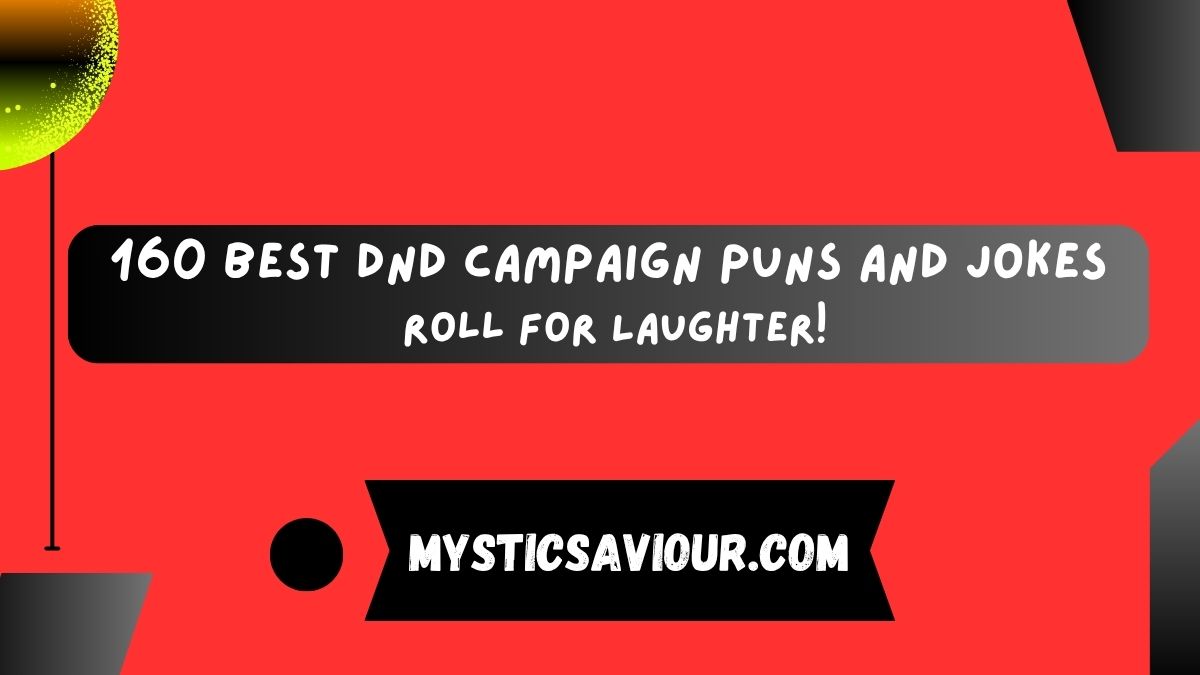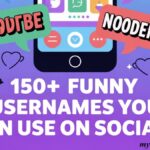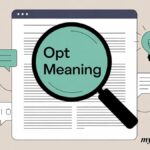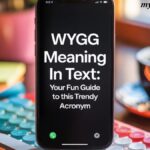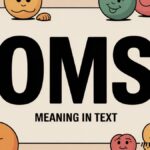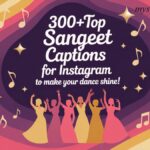“160 Best DnD Campaign Puns and Jokes: Roll for Laughter!” is a curated collection of the most clever, hilarious, and fantasy-inspired one-liners, quips, and puns designed to bring joy to any Dungeons & Dragons session. These jokes are tailored for tabletop adventurers, dungeon masters, and anyone who loves the whimsical side of fantasy roleplaying. Whether you’re deep into an epic quest or just passing time in a tavern, these puns are the perfect tool to lighten the mood and deepen the bond between party members.
This is where comedy meets critical hits—because every campaign needs more than just dice rolls and dragon slaying. A well-timed pun can become legendary around the table, sparking inside jokes and unforgettable moments. These DnD jokes aren’t just fillers; they’re the hidden treasures that make a campaign truly memorable.
With 160 of the best campaign jokes and puns, this guide ensures your adventures are filled with laughter alongside the action. From bardic wordplay to wizard-worthy zingers, each joke is designed to enhance the fun, charm, and camaraderie that define the DnD experience.
Campaign Puns: Rolling with Laughter at the Table
Campaign puns form the backbone of D&D humor. These clever wordplays capture the essence of adventuring while delivering perfectly timed comedy relief during intense moments.
Adventure-Based Wordplay
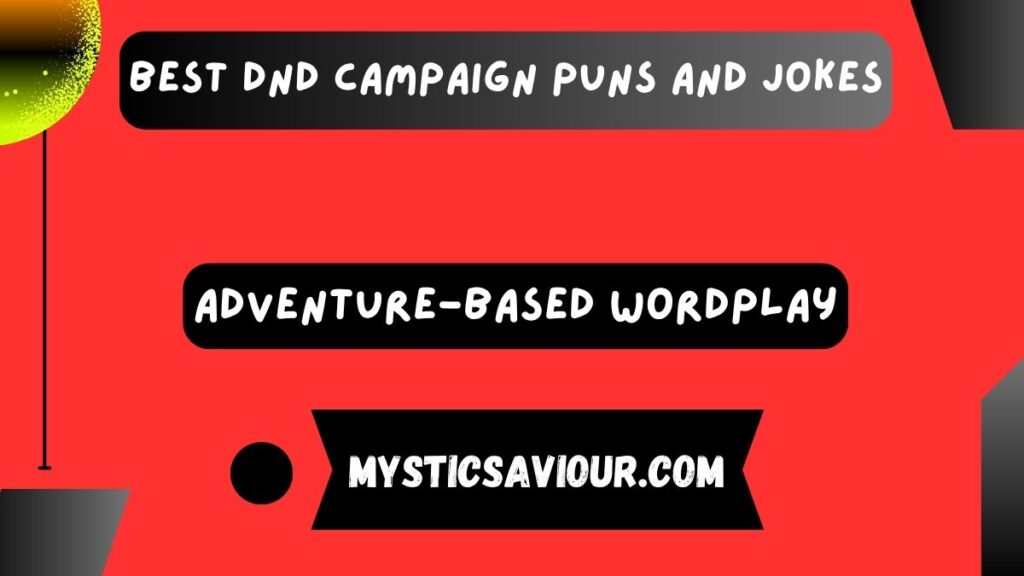
“Why don’t dragons ever get lost? They always know their scales!”
The beauty of adventure puns lies in their timing. Drop one during a tense combat encounter and watch your party dissolve into giggles. Smart DMs keep a mental arsenal ready for those perfect moments when tension needs breaking.
“What’s a rogue’s favorite type of music? Steal drums!”
Stealth check failures become infinitely more bearable when accompanied by appropriate wordplay. Your player group will appreciate humor that acknowledges their mishaps without diminishing the story’s importance.
Quest and Journey Jokes
“Why did the paladin break up with the cleric? She couldn’t handle his holy attitude!”
Fantasy tropes provide endless material for campaign-specific humor. These jokes work because they reference shared experiences every tabletop RPG enthusiast understands. The best campaign humor feels organic to your specific adventure.
“How do you organize a space party? You planet… wait, wrong campaign!”
Genre-bending jokes catch players off guard in the best way. When your medieval fantasy suddenly references sci-fi, the unexpected twist generates genuine laughter.
Table Dynamics Comedy
“What do you call a DM who never kills player characters? Myth-taken!”
DM planning humor resonates because it acknowledges the delicate balance between challenge and fun. These jokes create camaraderie between players and Dungeon Masters while highlighting the shared gaming experience.
D&D Jokes: Critically Funny Moments
Critical hit comedy strikes when you least expect it. These D&D jokes capture those perfect storm moments when everything aligns for maximum hilarity.
Dice Roll Disasters
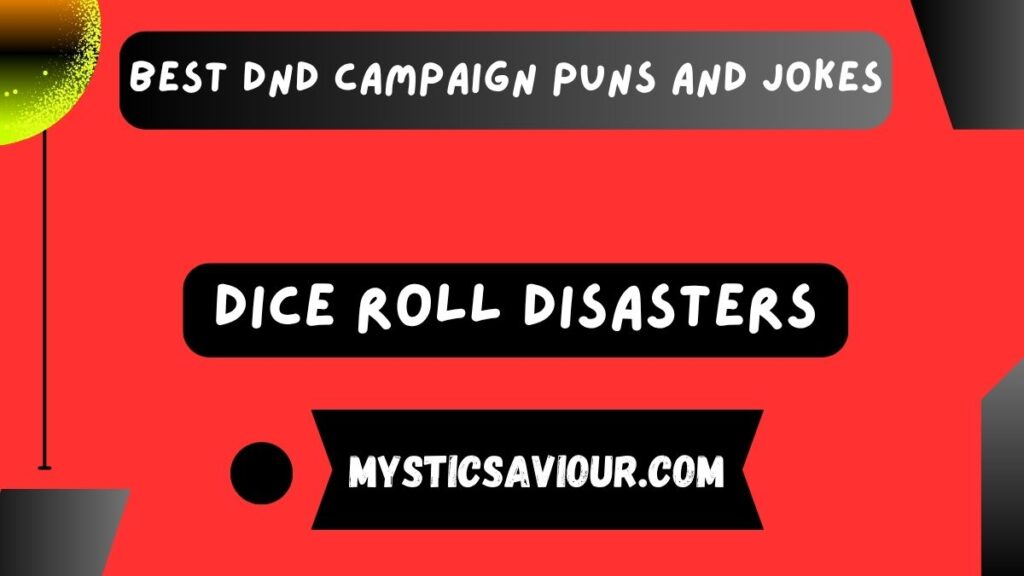
“Why don’t wizards ever win at poker? They always show their spell components!”
Dice roll humor acknowledges the random nature that makes roleplaying games simultaneously thrilling and frustrating. When your carefully planned spell fizzles because of a nat 1, laughter becomes the best coping mechanism.
“What’s the difference between a barbarian and a fine wine? The barbarian gets better with rage!”
Character class stereotypes fuel countless jokes because they ring true. Every player has witnessed the barbarian who solves every problem with violence or the bard who attempts to seduce inappropriate targets.
Combat Comedy Gold
“Why did the monk refuse dessert? He was already enlightened!”
Combat strategy jokes work because they blend mechanical knowledge with philosophical humor. Players who understand class abilities appreciate jokes that reference specific game mechanics while delivering unexpected punchlines.
“How many sorcerers does it take to cast Magic Missile? Just one, but they’ll argue about metamagic for hours!”
Spellcasting complexity provides rich material for comedy. These jokes resonate with players who’ve experienced the analysis paralysis that sometimes accompanies magical decision-making.
Initiative Order Insanity
“Why do rogues always go first in initiative? They’re naturally sneaky about time!”
Turn order becomes less frustrating when accompanied by appropriate humor. Smart players use waiting time to craft jokes about their upcoming actions or their party members’ previous choices.
Game Master Giggles: The Punishment is Real
Dungeon Master humor requires special finesse. These jokes acknowledge the unique challenges and responsibilities that come with running campaigns while keeping the mood light.
DM Preparation Puns
“What’s a DM’s favorite type of math? Multi-dice-tion!”
Campaign planning involves countless hours of preparation, and jokes about this process help players appreciate their Game Master’s efforts. These quips also provide DMs with material for self-deprecating humor when plans inevitably go sideways.
“Why don’t DMs ever get sick? They have too many hit points!”
Fantasy humor about DM invincibility playfully addresses the power dynamic inherent in tabletop RPGs. Players enjoy gentle ribbing about their Dungeon Master’s god-like abilities.
NPC Nonsense
“What do you call a helpful NPC? A myth!”
NPC interaction jokes capture the frustration players feel when non-player characters seem deliberately obtuse. These quips help process those moments when crucial information remains tantalizingly out of reach.
“Why don’t shopkeepers ever have sales? They’re afraid of losing their armor class!”
Campaign setting economics provide endless comedy material. When players realize they’re being overcharged for basic equipment, humor helps ease the sting of fantasy capitalism.
Rule Interpretation Comedy
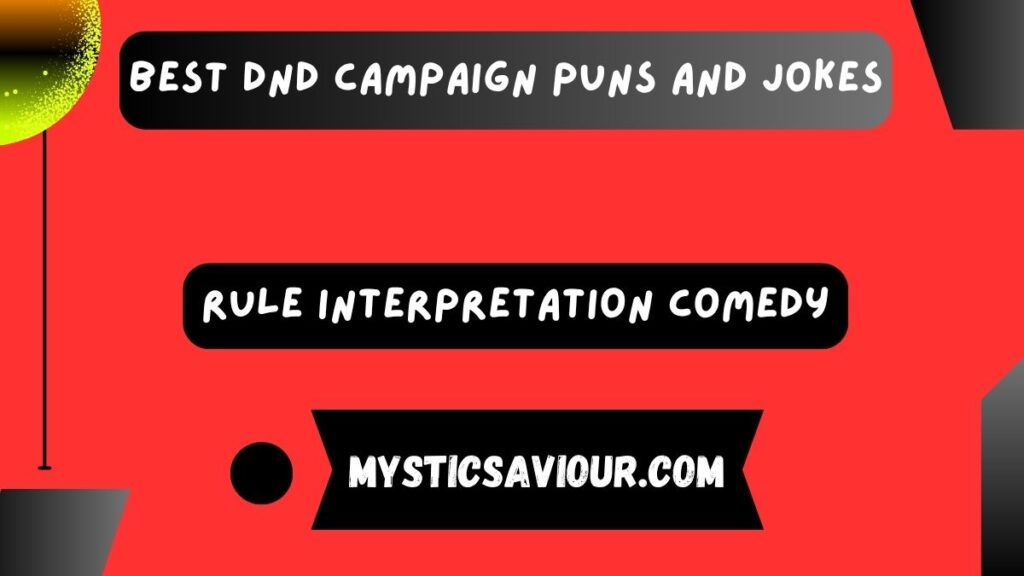
“How many rulebooks does it take to settle an argument? All of them, plus three hours of debate!”
Game mechanics disputes become more bearable when everyone acknowledges their absurdity. Smart DMs defuse tensions with well-timed jokes about the complexity inherent in comprehensive rule systems.
Character Creation Chuckles: Hilarious Backstories
Character creation provides fertile ground for comedy gold. These jokes celebrate the creative process while gently mocking common backstory tropes.
Class Combination Comedy
“What do you call a cleric/rogue multiclass? A holy roller!”
Multiclassing jokes appreciate players who create unique character combinations. These quips celebrate creativity while acknowledging the mechanical complexity that comes with hybrid characters.
“Why did the warlock become a bard? His patron wanted better entertainment!”
Character development humor recognizes the storytelling opportunities that emerge from unusual class combinations. Players enjoy jokes that validate their creative choices while providing material for roleplay.
Origin Story Absurdity
“Why are all adventurers orphans? Because having living parents would be too complicated for the DM!”
Fantasy tropes about tragic backstories become less cliché when everyone acknowledges their prevalence. These jokes help players embrace common elements while encouraging unique twists.
“What’s the most common ranger profession? Professional parent-loser!”
Character archetype humor allows players to engage with familiar patterns while maintaining awareness of their absurdity. The best backstory jokes celebrate creativity within established frameworks.
Alignment Antics
“What’s the difference between Chaotic Good and Chaotic Neutral? About three moral dilemmas!”
Alignment system jokes resonate because they address philosophical concepts through gaming terminology. Players who’ve struggled with moral decisions appreciate humor that acknowledges these complexities.
“Why don’t Lawful Evil characters ever jaywalk? Even villains have standards!”
Character alignment comedy helps players understand personality frameworks while keeping moral philosophy from becoming too heavy. These jokes make abstract concepts more approachable.
Combat Comedy: When the Dice Are Funny
Combat encounters generate natural comedy through unexpected outcomes and mechanical absurdities. These jokes capture the chaos that makes battle sequences memorable.
Attack Roll Absurdity
“Why did the fighter miss the barn? He rolled for stealth instead of attack!”
Critical fail moments become legendary when accompanied by appropriate humor. Players remember spectacular failures longer than routine successes, especially when comedy helps process disappointment.
“What’s a paladin’s favorite pickup line? ‘I’d like to lay hands on you!'”
Classical double entendres work because they blend mechanical knowledge with unexpected interpretations. These jokes require gaming familiarity to fully appreciate.
Damage Calculation Disasters
“Why don’t barbarians use calculators? They prefer to rage-quit math!”
Damage calculations complexity sometimes overwhelms players, and jokes about mathematical challenges help maintain momentum during complex sequences. Humor keeps frustration from derailing sessions.
“What do you call a sorcerer who can’t add damage dice? A wild magic surge waiting to happen!”
Spellcasting mechanics provide rich material for mathematical humor. Players who’ve struggled with complex spell effects appreciate jokes that acknowledge these challenges.
Monster Encounter Mayhem
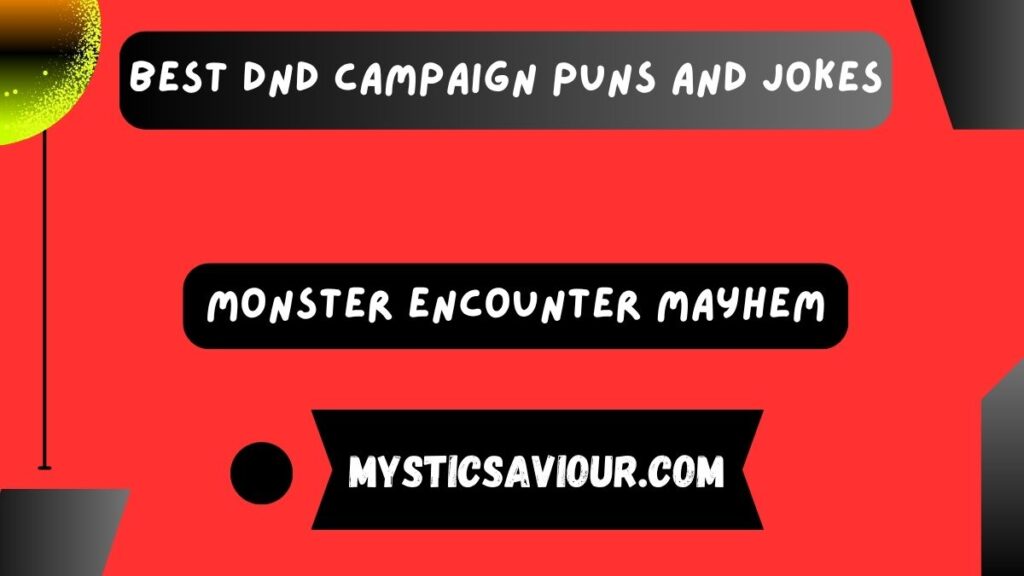
“Why don’t mimics ever get invited to parties? They’re terrible at small talk!”
Monster encounters become more memorable when creatures have distinct personalities. Mimics generate endless comedy because their fundamental nature subverts expectations about everyday objects.
“What’s a Gelatinous Cube’s favorite dance? The jiggle!”
Fantasy creatures with unusual physical properties inspire natural wordplay. These jokes help players remember monster abilities while adding personality to potentially repetitive encounters.
Initiative Order Insanity
“Why do rogues always complain about initiative order? They’re used to going first in everything else!”
Turn order mechanics sometimes create awkward situations, and humor helps maintain engagement during waiting periods. Players appreciate jokes that acknowledge the artificial nature of structured combat.
Magic Mishaps: Spellbinding Jokes
Magical mishaps provide endless entertainment value. These jokes celebrate the unpredictable nature of spellcasting while acknowledging the chaos that accompanies arcane power.
Wild Magic Wonders
“What do you call a sorcerer with wild magic? A walking probability experiment!”
Wild magic surge tables create memorable moments that players discuss for years. These unpredictable events generate natural comedy through their complete randomness and often inappropriate timing.
“Why did the wild magic sorcerer become a therapist? They’re used to dealing with unexpected emotional surges!”
Character class psychology humor helps players understand their characters’ mindsets while providing material for roleplay development. These jokes bridge mechanical concepts with personality traits.
Spell Component Silliness
“What’s a wizard’s least favorite grocery store section? Spell components… everything’s overpriced!”
Spell components create logistical challenges that smart players learn to anticipate. Humor about material requirements helps process the sometimes-absurd nature of magical prerequisites.
“Why don’t druids shop at magic stores? They prefer their components to be organic!”
Character philosophy jokes allow players to explore class themes through humor. These quips help define character personalities while maintaining awareness of mechanical requirements.
Familiar Funnies
“What do you call a familiar that won’t obey commands? A cat!”
Familiar relationships provide ongoing comedy opportunities because they involve personality interactions between the player and NPC. Smart DMs develop familiar personalities that generate natural humor.
“Why did the wizard fire his owl familiar? It kept asking ‘who’ during important conversations!”
Animal companion humor celebrates the absurdity of treating magical creatures as pets while acknowledging their intelligence and capabilities.
Enchantment Errors
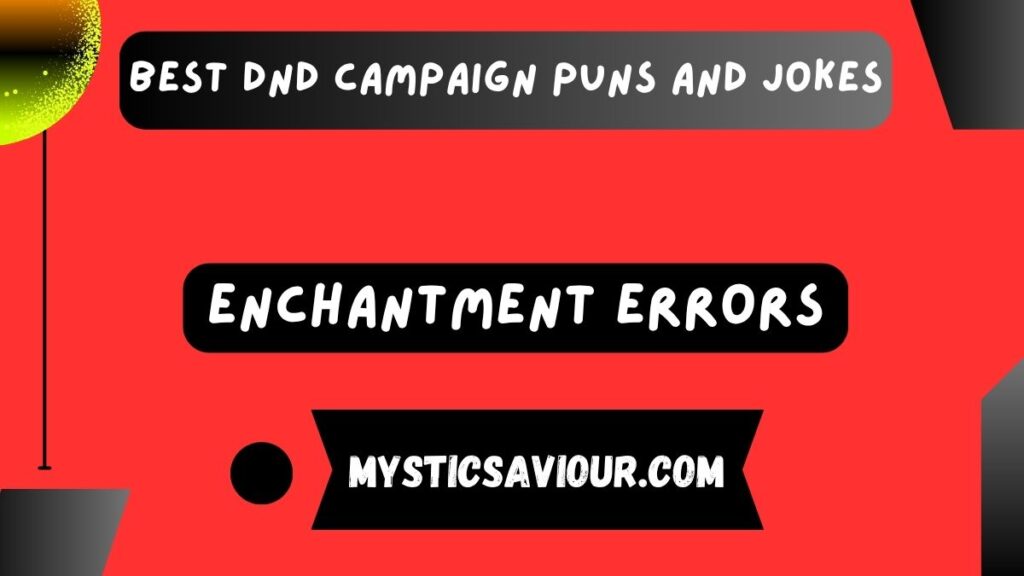
“What’s the difference between a charm spell and good customer service? Charm spells eventually wear off!”
Enchantment magic raises philosophical questions about free will and consent that become more approachable through humor. These jokes help players process complex moral implications.
“Why don’t enchanters make good salespeople? Their techniques are too obvious!”
Social magic applications inspire jokes about real-world parallels. Players appreciate humor that connects fantasy concepts with familiar experiences.
Session Silliness: Keeping the Campaign Light
Session management requires balancing serious storytelling with appropriate levity. These jokes help maintain group cohesion while acknowledging the absurdities inherent in collaborative storytelling.
Player Interaction Humor
“What’s the difference between a party and a mob? About two charisma points!”
Party dynamics generate natural comedy through personality clashes and alliance formations. Smart groups learn to appreciate their differences while finding humor in predictable patterns.
“Why don’t adventuring parties ever split up? They’ve seen horror movies!”
Adventure tropes become more palatable when everyone acknowledges their absurdity. These jokes help groups make smart tactical decisions while maintaining genre awareness.
Scheduling Shenanigans
“What’s harder than defeating a dragon? Getting five adults together on the same night!”
Adult gaming challenges require creative solutions and patient understanding. Humor about scheduling difficulties helps groups maintain perspective when life interferes with gaming plans.
“Why do DMs always overplan sessions? Because players will ignore 90% of it anyway!”
Campaign preparation reality rarely matches expectations, and jokes about this disconnect help Dungeon Masters maintain sanity while adapting to player creativity.
Food and Snack Jokes
“What’s a halfling’s favorite part of D&D night? Second dinner!”
Gaming culture traditions like communal meals create bonding opportunities that extend beyond dice rolling. Food-related humor celebrates these social aspects while referencing character traits.
“Why don’t elves ever bring snacks? They’re too busy meditating about proper nutrition!”
Character race stereotypes provide material for gentle ribbing that helps players embody their characters while maintaining social connections with fellow players.
Technology Troubles
“What’s more unreliable than wild magic? Video call connections during remote sessions!”
Digital gaming adaptations create new challenges that require technological solutions. Humor about technical difficulties helps groups maintain patience during connectivity issues.
“Why do online DMs always have backup plans? Because the internet is the ultimate chaotic evil force!”
Remote gaming realities inspire jokes that help players adapt to changing circumstances while maintaining gaming traditions in new formats.
Post-Campaign Ponderings: Reflecting on the Funny
Campaign conclusions provide opportunities for reflection and celebration. These jokes help groups process shared experiences while creating lasting memories.
Character Retirement Comedy
“What do retired adventurers do? They become NPCs in other people’s stories!”
Character endings deserve meaningful closure, and humor helps players transition from active participation to fond memory. These jokes celebrate character journeys while acknowledging their conclusions.
“Why don’t high-level characters ever truly retire? There’s always one more quest!”
Power scaling creates situations where characters become too powerful for ordinary challenges. Humor about this progression helps players understand why campaigns eventually end.
Campaign Memory Jokes
“What’s the most reliable party member? The note-taker!”
Session documentation becomes increasingly important as campaigns progress. Players who maintain detailed records provide valuable services that deserve recognition and appreciation.
“Why do players always remember embarrassing moments better than heroic ones? Because failure is funnier than success!”
Shared memories often focus on disasters and mishaps rather than smooth victories. This psychological tendency creates bonding opportunities through collective embarrassment.
Planning Next Adventures
“What’s a DM’s favorite phrase after finishing a campaign? ‘So, what kind of characters do you want to play next time?'”
Campaign transitions require careful planning and player input. Humor about this process helps groups maintain enthusiasm while learning from previous experiences.
“Why do players always want to try new classes after finishing campaigns? Because the grass is always greener on the other side of the character sheet!”
Character variety keeps gaming fresh and engaging. These jokes celebrate player curiosity while acknowledging the appeal of mechanical diversity.
Essential DnD Joke Categories Reference Table
| Category | Best For | Example Timing | Player Response |
|---|---|---|---|
| Campaign Puns | Adventure moments | Quest beginnings | Groans and grins |
| Critical Fails | Dice disasters | Failed rolls | Sympathetic laughter |
| Class Jokes | Character moments | Ability usage | Recognition humor |
| Combat Comedy | Battle scenes | Attack sequences | Tension relief |
| Magic Mishaps | Spell failures | Wild magic surges | Chaos appreciation |
| NPC Humor | Social encounters | Roleplay scenes | Immersion maintenance |
Top 10 Most Groan-Worthy DnD Puns
- “Why don’t rogues ever get married? They can’t commit to anything!”
- “What’s a bard’s favorite type of literature? Spell-binding novels!”
- “How do you make a paladin laugh? Tell them a holy joke!”
- “Why did the wizard refuse to use social media? Too many followers!”
- “What’s a druid’s favorite type of music? Heavy metal (armor)!”
- “Why don’t clerics ever lose arguments? They always have divine intervention!”
- “What do you call a barbarian in a library? A rage against the machine!”
- “Why did the warlock break up with their patron? The relationship was too binding!”
- “What’s a ranger’s favorite type of TV show? Animal Planet!”
- “Why don’t artificers ever get lost? They always have their bearings!”
Building Your Personal Joke Arsenal
DnD humor works best when it feels natural to your specific group dynamic. Start small with gentle wordplay and observe what generates positive responses from your players.
Timing matters more than content quality. Even mediocre jokes land perfectly when delivered during appropriate moments. Practice reading your table’s mood and energy levels.
Cultural references enhance jokes when everyone shares common knowledge. Tailor your humor to match your group’s interests and experiences outside of gaming.
Self-deprecating humor often works better than targeting other players. Make fun of your own character’s failures before poking fun at others’ mistakes.
Conclusion:
With the 160 Best DnD Campaign Puns and Jokes: Roll for Laughter!, your game nights will never be the same. These jokes add fun, break tension, and bring smiles to every player at the table.160 Best DND Campaign Puns and Jokes. From clever puns to silly one-liners, there’s something here for every adventurer, no matter their class or level.
Whether you’re a seasoned Dungeon Master or a first-time player, the 160 Best DnD Campaign Puns and Jokes: Roll for Laughter! is your go-to list for humor and lighthearted fun.160 Best DND Campaign Puns and Jokes Keep it close during your next session, and let laughter roll as freely as the dice.
FAQs
1. What’s included in “160 Best DnD Campaign Puns and Jokes: Roll for Laughter!”?
A collection of 160 clever one-liners, puns, and quips perfect for D&D sessions, covering classes, spells, creatures, and more.
2. Who is it best suited for?
Ideal for both players and Dungeon Masters looking to add humor during tabletop campaigns.
3. Are these jokes safe for all audiences?
Yes, the jokes are family-friendly and suitable for players of all ages with no offensive content.
4. How can I use these puns during play?
Sprinkle them in role-play, add them to NPC dialogue, or use them to lighten tense moments—great for dice-roll reactions or combat.
5. Where can I access the full “160 Best DnD Campaign Puns and Jokes: Roll for Laughter!”?
You can read the complete list on the publishing site (check for latest updates as of July 2025).

Eddie Smith, the admin of Mystic Saviour, is a language enthusiast dedicated to exploring the art of words. Passionate about Word Mechanics, Name Narratives, and Linguistic Twists, he helps writers, marketers, and creatives unlock the full potential of language. Through Mystic Saviour, Eddie brings fresh, imaginative alternatives to everyday expressions, making communication more engaging and impactful.
